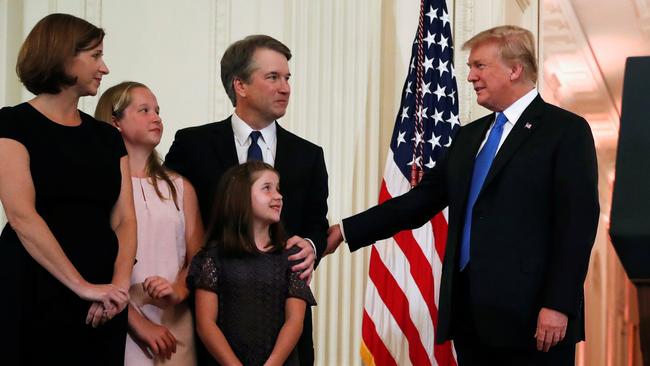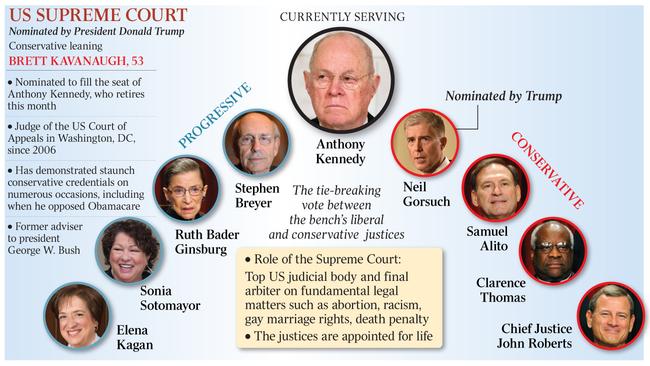Trump picks conservative Kavanaugh for Supreme Court
Donald Trump’s decision to nominate judge Brett Kavanaugh to the Supreme Court will to leave a legacy for a generation.

Donald Trump’s decision yesterday to nominate conservative judge Brett Kavanaugh to the Supreme Court promises to leave a lasting legacy across US society for a generation.
If the judge is confirmed by the Senate — and that is no certainty — then the highest US court will have a 5-4 right-wing majority far beyond Trump’s presidential term.
The significance of this can hardly be overstated.
Kavanaugh’s confirmation would recast the way the Supreme Court views key US battlegrounds, from gay rights and affirmative action to free speech, gun laws, capital punishment and abortion.
At 53, Kavanaugh, if confirmed, can expect to serve in the court for a further 30 years, establishing a conservative majority for the foreseeable future.
That is why Democrats see his nomination as a declaration of war, with Senate minority leader Chuck Schumer immediately vowing to oppose it “with everything I have — the stakes are simply too high for anything else”.
A Supreme Court with an entrenched conservative majority is likelier to limit affirmative action programs and take a critical view of gay rights and abortion, among a range of other hot-button issues.
There is even speculation that it may seek to overturn the 45-year-old landmark Roe v Wade decision that established a woman’s constitutional right to abortion, although such a move would be politically explosive.

All of this is abhorrent to liberal Americans but it will win plaudits from Trump’s conservative base, including evangelical Christians.
Even if Trump turns out to be a one-term president, his appointment of two conservative Supreme Court judges — Kavanaugh, coupled with last year’s appointment of Neil Gorsuch — will cement an enduring legacy.
It fulfils Trump’s promise to his base in 2016 to tilt the balance of the court decisively in favour of conservatives.
For Trump supporters there is even the tantalising prospect of the court leaning even further to the right given that, among its liberal judges, Ruth Bader Ginsburg is 85 and Stephen Breyer turns 80 next month.
If he is confirmed, Kavanaugh will replace the retiring judge Anthony Kennedy, 81.
Although Kennedy was a Republican appointed by Ronald Reagan in 1987, he was considered a bridge between conservatives and liberals, often infuriating both camps by moving unpredictably across ideological lines in his decisions.
Supreme Court decisions were difficult to anticipate, as Kennedy rarely gave clues to his thinking.
Kavanaugh is considered to be firmly in the conservative camp, entrenching a 5-4 majority for that side.
American liberals have not come to terms with the loss of Kennedy.
In April, The New York Times wrote an open letter to Kennedy begging him not to retire because it would allow a Trump nominee take his spot.
“If Mr Trump gets the chance to fill your seat, it will be the most conservative court in nearly a century,” the newspaper’s editorial warned. “If they (conservatives) can install another rock-ribbed conservative like Neil Gorsuch, the court will have a locked-in right-wing majority for the rest of our lifetimes … if you leave the dam breaks.”
Yet as much as Democrats may cry foul, Trump has every right to nominate conservatives to the court and honour his campaign promise.
The choice of a conservative to fill Kennedy’s position was never in doubt.
During the 2016 election campaign, Trump sought to reassure conservatives about his ideology by publicly releasing a list of conservative jurists who he would consider for any Supreme Court vacancy.
This list of 25 people, compiled by the conservative Federalist Society, had been whittled down to four finalists, Trump announced last weekend.
So, who is Brett Kavanaugh?
He is a favourite of the Republican legal establishment, having worked for the George W. Bush administration and for special prosecutor Kenneth Starr during his Whitewater investigation into Bill and Hillary Clinton’s real estate investments in the 1990s.
He is Ivy League, having been educated at an all-boys Jesuit school and then at Yale, and raised in Bethesda, Maryland, on the outskirts of Washington, DC, by parents who were both lawyers.
Kavanaugh referred yesterday to his mother — a schoolteacher who became a judge — as the “real” Judge Kavanaugh. “Her trademark line was, ‘Use your common sense — what rings true, what rings false.’ That’s good advice for a juror and a son,” he said.
“One of the few women prosecutors of that time, she overcame barriers and became a trial judge. The President introduced me tonight as Judge Kavanaugh. But to me, that title will always belong to my mum.”
The depths of Kavanaugh’s political links almost guarantee they will come under attack from Democrats during the nomination process.
After completing his legal clerkship, Kavanaugh, then in his early 30s, helped Starr investigate the Clintons. The investigation spread to include Bill Clinton’s sexual relationship with Monica Lewinsky.
Kavanaugh became a lead author in the controversial 1998 Starr report, which laid out 11 grounds for Clinton’s impeachment based on the Lewinsky scandal.
After the 2000 presidential election, Kavanaugh entrenched his conservative credentials by joining the Bush administration, serving for six years as associate White House counsel and then as staff secretary. During this time he met his wife, Ashley, who was Bush’s private secretary.
The Kavanaughs have two daughters, aged 10 and 12.
When Bush tried to appoint Brett Kavanaugh to the US Court of Appeals for the District of Columbia Circuit in 2003 and again in 2005, Democrats knocked him back for being too conservative.
“You could not think of another nomination, given Mr Kavanaugh’s record, more designed to divide us,” Schumer said back in 2004. “This nomination appears to be judicial payment for political services rendered.”
Bush eventually succeeded in appointing him to the court in 2006, where he stayed for 12 years.
Kavanaugh’s closeness to the Bush administration is said to have given Trump pause for thought. The President is no fan of the Bushes and the feeling is mutual.
But Kavanaugh’s cause may have been helped by a 2009 article he wrote for the Minnesota Law Review in which he argued that sitting presidents should not be distracted by civil lawsuits, criminal investigations or interviews with prosecutors while in office.
He said a president should be exempt from “time-consuming and distracting” lawsuits and investigations, which “would ill-serve the public interest, especially in times of financial or national security crisis”. Such views would have been welcomed by Trump, who faces the prospect of being interviewed by special counsel Robert Mueller as part of the broad-ranging Russia investigation.
Yet the extent of Kavanaugh’s conservative leanings is unclear on some issues. He is known to support fewer university options for affirmative action and a tougher stance on criminal defendants. He is pro-gun, having opposed a ban on assault rifles, and has been a strong critic of excessive regulation, frequently targeting the Environmental Protection Agency. But in 2011 Kavanaugh declined to find that president Barack Obama’s healthcare law — strongly opposed by Republicans — was unconstitutional.
On other issues, less is known. Kavanaugh has no record on gay rights or on same-sex marriage.
He is anti-abortion but it is unclear how far he is willing to push this. Trump vowed in 2016 that he would appoint judges who opposed the Roe v Wade ruling.
Last October, Kavanaugh chose to dissent when the full DC Circuit prevented the Trump administration from blocking a teenage migrant at the US-Mexican border from obtaining an abortion.
But Kavanaugh has never expressed outright opposition to Roe v Wade and it is unclear whether he would be willing to join in any attempt to overturn it.
Given that Kavanaugh’s confirmation would enshrine a conservative Supreme Court majority, the Democrats are gearing up for a fight to block him.
Fifty Senate votes are required for his confirmation, and even a single dissenting Republican senator could tip the balance.
Republicans hold a bare 51-49 majority in the Senate, with one of their number, John McCain, stricken with brain cancer and unable to vote.
To win Kavanaugh’s confirmation, Trump will need the votes of Republican senators Lisa Murkowski and Susan Collins, who support the right to abortion and would be wary of any nominee who could undermine it.
Republicans, meanwhile, will be hoping that several of the Democratic senators up for re-election in Trump-majority states in November’s midterm congressional elections will break ranks and try to save their seats by endorsing Kavanaugh’s nomination.
Timing is also an issue. Trump needs to secure the confirmation before November, as there is an outside chance Republicans could lose control of the Senate.
All up, it will be a fraught and bitter process, with the debate over Kavanaugh’s nomination reflecting the polarisation in US politics.
But if Kavanaugh is confirmed, Trump will have delivered to his base one of his most important promises — and one that will change America.
Cameron Stewart is also US contributor for Sky News Australia.




To join the conversation, please log in. Don't have an account? Register
Join the conversation, you are commenting as Logout